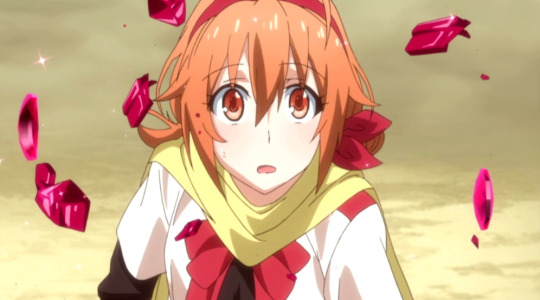Sometimes execution just isn’t enough.

Studio Doga Kobo is trying their damnedest with both of these shows, filling them with expressive faces, lots of motion both in terms of animation and shot selection, and energetic vocal performances. And that would probably be enough to sell me on both these series—if only the writing were even a little bit better. One of these series fritters its fascinating premise away on cliche interactions, while the other juggles a large, likable cast but struggles with a generic premise and shallow conflicts. And man, are they both trying real hard to be funny and doing a realmediocre job at it.
So yeah, this digest post ain’t the most positive thing I’ve written, but you’re welcome to hit the jump for specifics on what worked, what didn’t, and whether either of these shows will get a chance to prove themselves next week.
Plastic Memories

All that stuff I was worried about during the premiere has not only continued to be an issue, but has sort of become the central focus of the story. Plastic Memories’ premise has so many complicated implications and potential roads for exploration, from speculative questions concerning the morality of creating artificial intelligence, to contemporary questions about the ethics of euthanasia, and on to just good ol’ time-honored Buddhist themes of human transience and personal attachments.
And yet for all that, PM seems bound and determined to waste its fascinating premise on a cliche, maudlin romance chock full of anime/LN tropes and some truly disgusting “advice” on how to sexually assault your female roommate which is played as “humorous rom-com shenanigans.” It’s a weak season so I’ve been giving a lot of shows a lot of leeway, but Plastic Memories has drifted so far off-course it’s basically in another ocean. Unless I start hearing about some drastic improvements both in terms of character interactions and tone, I seriously doubt I’ll be back.
Mikagura School Suite (Mikagura Gakuen Kumikyoku)
Mikagura has the opposite issues from Plastic Memories: The cast is diverse and pretty likable, and while the humor is real hit-and-miss, outside of some of Eruna’s fantasies (which often toe the line between teenage silliness and just plain creepy) there’s nothing here to actively dislike. The problem is that there’s also nothing here at all, not really. It’s not as intentionally silly as Show by Rock nor as unintentionally silly as Seraph of the End, falling somewhere in the middle where it wants to be funny while also taking its characters and world seriously. In other words, it requires us to be invested in its story/characters, and I’m having a tough time doing that even after spending 60 minutes with it.
Despite some solid animation, the “school club battles” premise doesn’t provide much in the way of tension or riveting plots, and while the characters are pleasant enough, none of them (with the possible exception of Seisa) have shown much in the way of depth, so all potential character drama feels very low-stakes at this point. Maybe that’s the key word for Mikagura—“stakes”—and right now none of them are all that compelling. I’ll likely pop back in next week to see if Eruna’s new goals give the show some momentum or at least the potential for solid character development, but if it can’t hook me by then, I suspect this one will slip off the watch list, too.

